Keira Burton
This is your first of three free stories this month. Become a free or sustaining member to read unlimited articles, webinars and ebooks.
Become A MemberThis story was originally reported and published by MindSite News, a nonprofit news site that reports on mental health. Sign up for the MindSite New Daily newsletter.
Tonya Wright was worried sick about her son Kenny. His beloved brother Michael had died two years earlier of stomach cancer, and like her, he had taken it hard.
A star football player in high school and a devoted father, Kenny had gotten in trouble with drugs – something that upended his life. But he had just been released from jail and was settling into a halfway house – safe and supported, or so she believed. She had been getting daily phone calls about his progress. Then there were two weeks of silence.
The next call was from the Philadelphia morgue.
Kenny, 39, had died on the 4th of July, 2022. He had been stripped of his clothes and his body found sprawled in the middle of the street in Philadelphia’s Kensington neighborhood.
An autopsy determined that Kenny died, like so many others in the last few years, from a combination of the synthetic opioid fentanyl and xylazine or “tranq,” a horse tranquilizer-turned-street-drug that causes devastating flesh wounds. The news that her son had died of a drug overdose made his death still more agonizing.
Wright, who lives in Baltimore, spent much of the next year trying to get straight answers on the circumstances of his death.
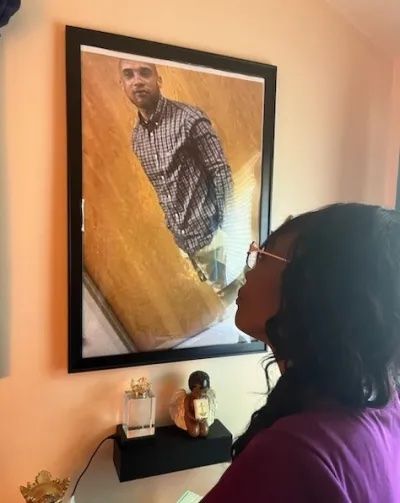
Tonya Wright looking at a photo of her son Michael, who died of cancer. (Courtesy photo)
“That’s when the nightmare began for me,” recalled Wright, whose husband drove with her to Philadelphia to try to get more information in person. “I realized I was entering into a very lonely place. Nobody wanted to help me.” Calls and letters to local news outlets, five different police stations, Kenny’s parole officer, the halfway house and the hospital yielded little information and still less sympathy. She said everyone spoke to her as if she, too, were an addict rather than a grieving mother.
But a month later, Wright got another call from Philadelphia, this time from Kaitlin Worden, a licensed clinical social worker and the bereavement care manager for Philly HEALs, an acronym for Healing and Empowerment After Loss. It’s Philadelphia’s free bereavement support program for people who have lost a loved one to a fatal overdose.
“At that point, I was so humiliated and disgusted with the process,” Wright remembered. “But Kaitlin started out the conversation talking about Kenny. It was the first time anybody called him by his name. What she brought to me was a little bit of hope, that my son mattered, that he was a human being. It was my God and Kaitlin that helped to heal me.”
Philadelphia’s overdose bereavement services were started in 2019 by social worker Laura Vargas, part of a team providing bereavement services in the city Medical Examiner’s Office. The office’s main job is to determine the cause of death for sudden, unexpected and unnatural deaths, but it is also one of a handful of medical examiner offices around the country that offer bereavement support to survivors traumatized by sudden, shocking losses such as fatal shootings, suicides, accidents or the deaths of children.
Vargas started out making outreach calls to the next of kin of Philadelphia residents who had died of a drug overdose, asking if to see if they needed help. But she didn’t have time to offer individual bereavement counseling. Philly HEALs, as the bereavement program was dubbed in 2021, then transitioned to the health department’s Division of Substance Use Prevention and Harm Reduction, which was able to hire additional staff. Program staffers continue to work closely with the Medical Examiner’s Office.
The division’s job is to help staunch the city’s ongoing overdose crisis through public health data tracking, harm reduction strategies such as distribution of naloxone and fentanyl test strips, and community engagement, said its director, Andrew Best, Jr., a clinical social worker.
It’s among the growing number of hospices, grief support organizations, community agencies and health departments around the country struggling to respond to the deluge of drug-related losses. Other grief organizations formed in response to opioid overdoses include Support After a Death by Overdose, which provides resources, information, and assistance to people throughout Massachusetts; Grief Recovery After a Substance Passing (GRASP), which meetings locally with members in the U.S. and Canada; and Love in the Trenches in Baltimore, which describes itself as “a nonprofit for parents who are suffering the collateral damage of their child’s addiction.”
But the Philly HEALs program is unusually comprehensive, offering grief counseling and peer support groups for families, teens and children as well as bereavement support for peers and clinicians. It offers overdose survivors a variety of opportunities to talk about the unspeakable with others who have experienced similar losses, and to start working through a grief complicated by guilt, shame, social stigma, isolation and “if onlys.”
For Wright, the program’s greatest gift has been the opportunity to connect with other mothers who feel shunned and alone in what psychologists call “disenfranchised grief.” She attends its Zoom parents support group for grieving mothers and fathers, with a variety of other moms. “A lot of them still have no answers for their basic questions,” she said. “When someone new comes into the group, we’re all on the phone, trying to help.”
Like someone killed by gun violence, a death from substance use is sudden and all-consuming.
An overdose death is a traumatic loss, said Worden of Philly HEALs. “It happens instantaneously. Somebody was here and now they’re gone. There’s no chance to say goodbye. You can’t really prepare for it and it feels like a shock.”
Relatives of people living with addiction also grieve the loss of who that person used to be and the relationship they once had. “You still hope that one day you’ll be proved wrong, and you will get to be with them again as they were, that they will get better,” she says. “But when you lose someone to an overdose, it’s final. It’s the extinguishing of hope.” There might even be some perplexing feelings of relief that the perpetual crisis is finally over.
On top of that, there’s the crippling stigma that survivors face, even in their darkest moments. A lot of blame gets spread around after an overdose death, said Worden. “Sometimes, there’s blame on the survivor, especially on the parents—which could be self-blame or imposed by others.”
A lot of people Worden works with feel they can’t talk about their loved one’s death with anyone other than their counselor. They often keep their grief to themselves because they don’t want judgments passed on themselves or their family. “There is this drive to protect their loved one’s legacy,” she said.
But a big part of healthy grieving is connecting with other people and talking about your loss – not keeping it pent up inside.
“Finding your community, finding people to talk about it with, is part of starting to reconnect to society and integrate your grief into your life,” Worden said. “If you don’t have that, if you don’t know who you can trust to talk about it or feel like you need to keep it a secret, that’s huge.”
Taunya Ransom, who lost her husband Rhasaan to an overdose death in December 2022, said that when the program first contacted her, her curiosity was piqued by the “Hot Widows” biweekly support group. The name – apparently inspired by the 2019 non-fiction book “The Young Hot Widows Club” as well as the “Hot Widows Club Podcast” by two young women who lost the loves of their lives – is not intended to minimize the loss of an irreplaceable partner, but to remind the living that they can survive their grief and perhaps one day find another love.
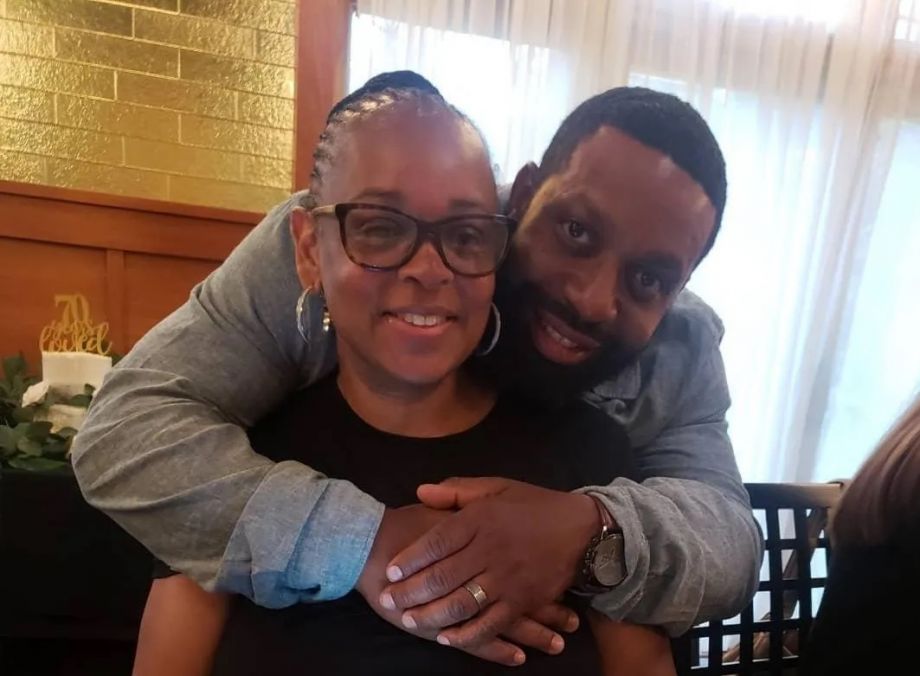
Taunya Ransom with her late husband Rhasaan, who overdosed last year (Courtesy photo)
“Little did I know there would be so many women who also lost a husband to an overdose,” Ransom says. “I was looking for some kind of outlet where I could listen and share. The support and love I’ve experienced has been outstanding – a sisterhood we share.”
Ransom is still grappling with a lot of raw emotions. Because an overdose death is viewed by many as “preventable,” the shadow of stigma falls not only on the user, but their partner, she said. “People treat you differently when they know. I felt I didn’t want to tell people how my husband died. In the group, we talk, we share, we laugh, we cry. It has really been helpful, just feeling free to talk about this kind of loss and what we all went through with our loved ones.”
That includes being able to express the kinds of emotions she normally keeps inside, including anger at her late husband. “They helped me to see that was OK,” Ransom says. An app allows her and other members of the group to connect by text between Zoom meetings or make a call. “I don’t have to be alone, knowing I can pick up the phone and contact somebody.”
When people learn their loved one has overdosed, they may not be ready to talk about it or to seek supportive services, Best sais. “It may take several years, but we want to make sure that the resource is always available, no matter what the time frame.”
The skyrocketing incidence of drug overdose deaths nationwide has been well documented, increasing fivefold nationally over the past two decades. In 2021, the country logged 106,699 deaths by overdose.
Philadelphia has the highest overdose rate of any city in the state and one of the highest in the country. Between July 1, 2019, and March 22, 2023, its overdose bereavement program attempted to connect with the surviving loved ones of 4,560 “OD decedents,” reaching 3,925 of them and delivering a total of 11,552 bereavement support services, primarily outreach, counseling, and groups.
“Obviously, we’re losing a majority to fentanyl, although often it’s fentanyl and xylazine together,” Worden explained. “Or fentanyl mixed with cocaine. Some may be taking cocaine, not realizing the dangers of potentially having fentanyl in it.”
And fentanyl and addiction don’t discriminate. “It’s every class, race, gender, age, everybody across the spectrum is affected by this,” Worden said. “Some people might have a certain idea of what somebody who dies from a drug overdose looks like, or what that person’s moral character is like, or things like that. But that’s just not true.”
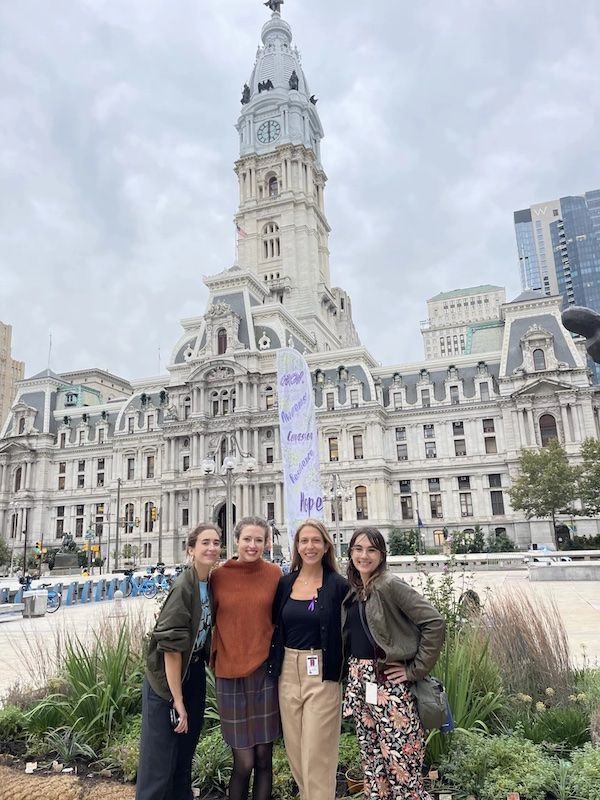
Philly HEALs team picture at the Overdose Memorial Garden in Philadelphia with former program manager, Laura Vargas. Left to right: S. McNamara, K. Worden, L. Vargas, & C. Giles. (Current team members R. Essy and A. Jiménez-Trail not pictured.)
Worden came on board as a counselor at Philly HEALs in October, 2020, and took over as program manager when Vargas moved to another job. The organization has continued to grow in response to need and today employs five full-time clinicians, including a bilingual Spanish-speaking counselor and one primarily working with children and adolescents, aged 5 to 18, affected by substance abuse of a loved one. It plans soon to hire two more, another child and adolescent counselor and a community engagement and outreach worker, Best said.
Support for those who have lost a loved one to a fatal drug overdose starts with an outreach call days or weeks following the death. People are offered short-term, one-on-one sessions with a professional grief counselor, a variety of support groups, including those specifically for parents and groups for partners such as the “Hot Widows Club,” Grandparents Raising Grandchildren and a drop-in support group open to all. There are also connections to peer support from someone else who is grieving this kind of loss.
Educational sessions focus on grief and coping, such as strategies for getting through the holidays. Special events range from a six-week pop-up memorial garden last year in Thomas Paine Plaza to a group outing to an art museum’s grief exhibit. Survivors have also joined in a trauma-informed therapeutic writing course, led by expressive arts therapist and bereavement care provider Cadence Giles, and an open mic reading at a community center in South Philly to share some of that writing with an appreciative audience.
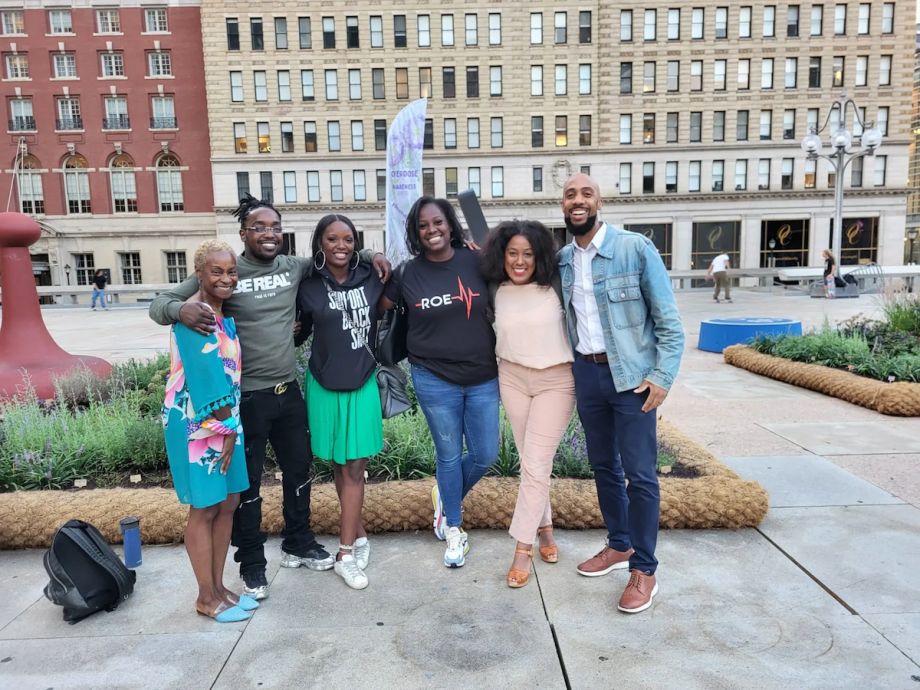
Former Philly HEALs therapist Shawanda Smith leads a panel of city government leaders in discussing why Black Grief Matters. (Courtesy Philadelphia Department of Public Health)
Most of the counseling and groups are held virtually, by phone or Zoom, a pattern imposed by the COVID pandemic but carried on due to lack of accessible meeting space. Zoom allows more people from all over to participate, with fewer barriers, Worden says. In the past, in-person groups were not as well attended.
But she has a goal of expanding in-person bereavement support. “People are hungry for it, especially after the pandemic. Once we get our team a little less overloaded, we aim to offer pop-up grief support for folks to drop in when they feel ready.” Also, not everyone in need has a phone or computer, and the people who may need support the most may not be listed as next of kin. They need to be reached in other ways.The outreach worker, who will be based in the community and work with people in need, will pay particular attention to supporting people who are themselves using drugs or who have already experienced multiple losses. “I believe grief care is preventive care, period,” Worden says. “You’d be shocked how many people die of an overdose weeks or months after they lost somebody important to them.”
Overdoses challenge our ideas of what grief should look like, Worden concludes. “We provide education and reality testing. We try to reduce the stigma.” The power of community is the best intervention for this kind of grief, she said: “It lets people know they’re not alone.”
It’s been a year since Tonya Wright lost her son to an overdose. “I’m just starting to understand what happened to Kenny. He only had $20 in his pocket, but that can buy enough drugs to kill you,” she said. “I did not know about fentanyl, or what tranq was, before all this. I was clueless when they said that’s what he died of.”
When her son Michael died, Wright founded a charitable non-profit organization called Better Dais Ahead in his memory, with a mission of promoting financial and other support for children who have lost a parent. But after she lost Kenny, she said, “I had shut myself down. I was just so numb and angry. I had been losing my faith in helping people.”
Now, she said, “I’m really trying to move forward. My goal is not to remain in a support group for the rest of my life. I want to take the tools they have given to me to move on with my life and to help my family. My ultimate goal is to fully return to my nonprofit, assisting individuals who are less fortunate than myself.”
That, she feels, is the best way she can honor her sons.
Larry Beresford is a freelance medical writer and health care journalist specializing in hospice, palliative care, end-of-life care, grief and bereavement, opioid pain management and related fields. He writes regularly for The Hospitalist Magazine, EMS World Magazine and Medscape and has authored the definitive consumer’s guidebook to hospice care (The Hospice Handbook: A Complete Guide, published by Little, Brown & Co.).
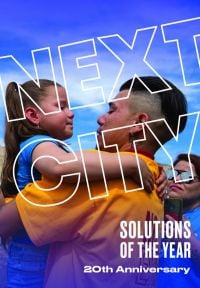
20th Anniversary Solutions of the Year magazine